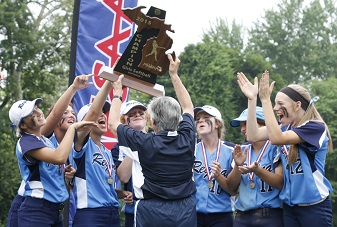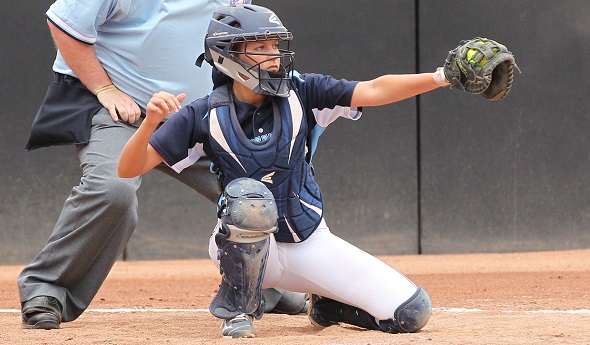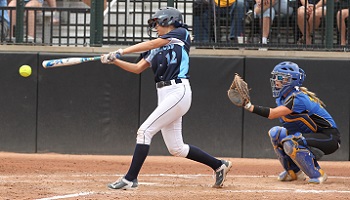
Detroit Powers Succeed Amid Lower Numbers
By
Tom Markowski
Special for Second Half
April 20, 2016
Participation in spring sports, following a similar decline in student-aged population in Michigan, has been on a decline statewide over the last decade.
 But while some like baseball have experienced a slight bounce-back over the last few seasons, softball in particular has seen its numbers continue to fall.
But while some like baseball have experienced a slight bounce-back over the last few seasons, softball in particular has seen its numbers continue to fall.
Coaches and administrators in the Detroit area point to a number of factors intertwined that produced a snowball-like effect – and now it seems to have come to a head.
Three softball programs in the Catholic League Central, a division that competes at a high level statewide, don’t have sufficient numbers to field a junior varsity this spring. Many programs don’t sponsor freshmen teams for the same reason.
But for schools like Birmingham Marian, Farmington Hills Mercy and Livonia Ladywood not to have a junior varsity softball team is quite shocking to some – especially considering that Mercy enters this season ranked No. 3 in Division 1 and Ladywood is No. 2 in Division 2.
Specialization fallout
Marian athletic director Dave Feldman isn’t among those stunned. He saw this coming. Feldman points to the 2007-08 school year when the Michigan High School Athletic Association was forced, by court decision, to switch the volleyball season from the winter to the fall and the girls basketball season from the fall to the winter.
Feldman has a daughter, a freshman at Marian, who participated on the junior varsity volleyball team this fall. When that season was over she joined a club volleyball team. Feldman said the club volleyball season begins in December and continues on into June.
“It’s not AAU,” Feldman said. “But you need to be an AAU member (to play). They play all of the time. Heck, they played on Easter Sunday. And every club is filled.”
The pressure on athletes to play year-round is arguably greater now than it ever has been, and can come from coaches, peers and family – based on a frequent misconception that if athletes want to earn a scholarship, they better keep up with the Joneses or be left behind.
Feldman said he’ll back his daughter with whatever decision she makes. If she wants to play volleyball nine or 10 months a year, he’ll support that. But Feldman said, financially, it’s getting out of hand. He estimated between the cost of airfare, hotels and meals that he’ll spend $6,500 in support of his daughter playing club volleyball.
And, according to Feldman, the increase in attention on volleyball is affecting participation in other sports.
“(Girls) basketball is fighting for its life,” he said. “Our field hockey program (a fall sport) is fine. Our lacrosse teams are fine.
“We have 15 playing volleyball at all three levels. We had 16 (total) try out for softball and we made two cuts. We haven’t had a JV the last two years. The last time we had a freshman (softball) team was in 2004 or 2005. The last few years the numbers have dropped off. It’s the specialization.”
Simply signs of change?
Warren Regina is another member of the Catholic League Central. Regina athletic director Diane Laffey also is the head coach for softball and basketball, and she said she thinks lacrosse has drawn some athletes away from softball – which makes sense, although the total number of girls playing high school lacrosse in Michigan has increased only about 1,000 over the last decade, while softball participation is down 4,000 athletes over the same time.
One should not use Regina as an example of decline – Laffey’s team won the Division 1 championship last spring and fields a softball team at all three levels. At the same time, Regina also has seen a rise in participation in lacrosse. There are 18 playing for both the varsity and junior varsity this spring, the highest participation in school history.
Mercy varsity softball coach Alec Lesko said, simply, that times have changed. Mercy reached the Division 1 Semifinals last season, just as Ladywood did in Division 2 the year before – yet despite this success, Mercy’s number of softball players also has declined.
 “(The students) have many more options,” Lesko said. “In addition to their school work there’s band, theatre, honors society clubs. In the past kids would play three sports and be in the band. All of my daughters were multi-sport athletes. By their sophomore year they had to make a decision (on which sport they would concentrate).
“(The students) have many more options,” Lesko said. “In addition to their school work there’s band, theatre, honors society clubs. In the past kids would play three sports and be in the band. All of my daughters were multi-sport athletes. By their sophomore year they had to make a decision (on which sport they would concentrate).
“It’s also economics. They want to earn a scholarship. You hear horror stories about (the cost of) student loans. Even the big schools have trouble getting the (students to play softball).
“As far as college, and I can only speak about softball, the Big Ten coaches want the player they recruit to play other sports,” Lesko added. “I hope to have a JV program next year. A player that misses 30 JV games, we will feel that crunch later. There are those who think JV softball is a waste of time, that you should just compete in travel (during the summer). We will get some of those kids. Those who compete in travel then come to us as sophomores.”
Reasons for optimism
Don Peters is the softball coach at Clarkston, and between coaching travel and at the high school level he’s put in 35 years. He coached travel before taking over the Clarkston program. Peters said the two complement each another, or at least they should.
“I know some disagree,” he said. “The girls have a lot of choices in the spring. Look at all of the sports they can play. I don’t think lacrosse has cut into the numbers. Not yet, but it’s probably going to. We haven’t been affected. We have 45 (covering three teams) in our program. We really push softball in our community because it’s been established.”
Peters said coaches in softball and baseball need to make the game enjoyable, and one way is to reward those who chose to participate by playing them on a regular basis. A student who is No. 14 or 15 on a squad often will play once a week and, with all of the options available, isn’t willing to put in the practice time for limited game action.
Mercy senior first baseman Abby Krzywiecki played a variety of sports before her freshman year. It was then she decided that softball would be her main sport and she chose to pour all of her energy into it.
She said it’s not all gloom and doom for her sport.
“We had a small freshmen class (last year),” she said. “When I came in we had a large class. It was one of the biggest. It’s not that we’re not getting softball players. In the travel world, it’s becoming more intense. We have more younger people playing. The sport is getting more intense. The talent level is getting higher.”
 Tom Markowski is a columnist and directs website coverage for the State Champs! Sports Network. He previously covered primarily high school sports for the The Detroit News from 1984-2014, focusing on the Detroit area and contributing to statewide coverage of football and basketball. Contact him at [email protected] with story ideas for Oakland, Macomb and Wayne counties.
Tom Markowski is a columnist and directs website coverage for the State Champs! Sports Network. He previously covered primarily high school sports for the The Detroit News from 1984-2014, focusing on the Detroit area and contributing to statewide coverage of football and basketball. Contact him at [email protected] with story ideas for Oakland, Macomb and Wayne counties.
PHOTOS: (Top) A Farmington Hills Mercy hitters prepares to connect during last season's Division 1 Semifinal against Caledonia. (Middle) Warren Regina coach Diane Laffey hoists her team's championship trophy after the Saddlelites downed Caledonia in the Final last spring.

Catcher's Grit Shines in Health Scares
By
Tom Markowski
Special for Second Half
April 9, 2018
RICHMOND – Evelyn Swantek couldn’t have imagined what her day would be like when she awoke on Aug. 8 of last year.
 Dressed in shorts and a T-shirt on a seasonably warm summer morning, Swantek went for a mile run as part of the training that all varsity volleyball players at Richmond High School were expected to complete.
Dressed in shorts and a T-shirt on a seasonably warm summer morning, Swantek went for a mile run as part of the training that all varsity volleyball players at Richmond High School were expected to complete.
Near the end of her run, Swantek noticed something wasn’t quite right. A bit of fatigue, yes, but it was more than that. She went home and told her father, Dave Swantek, that she was going to take a nap. But when she awoke, her world changed dramatically.
“It came out of nowhere,” she said. “I woke up and couldn’t talk. Part of my face went numb and I couldn’t see out of my right eye. And my neck was really big.”
A bit dazed by the sudden physical change of the youngest of his three daughters, Dave Swantek drove her to the hospital not knowing what was wrong.
Thankfully, Dave was home on a vacation day while his wife, Julie, was at work. He was attending to a couple of odd jobs around the house when his daughter came home.
“Evie came in and said she was tired, and wanted to take a nap,” he said. “She got up and came downstairs; immediately I knew something was wrong. It’s something, as a parent, you just don’t want to see.”
The Swanteks arrived at McLaren Hospital in Mount Clemens and, after the diagnosis, were told that Evie had developed blood clots – one in her throat and one in her face, and that she had suffered a Transitory Ischemic Attack (TIA), commonly known as a mini-stroke.
Dave Swantek said the doctors immediately took his daughter off the blood-clotting medication she had been taking since January.
On New Year’s Eve, 2016, Evie experienced abdominal pain while celebrating the arrival of the New Year with family members. She was taken to McLaren Hospital, where exploratory surgery was performed and she was diagnosed with endometriosis. Endometriosis is a condition in which a layer of tissue that normally covers the inside of the uterus grows outside of it. One of the main symptoms is pelvic pain.
 At the time, the Swanteks never gave it a second thought. Evie took medication, didn’t miss a day of school and continued to compete on the varsity basketball team. After that season ended, Evie made the varsity softball team for the first time and was named the starting catcher by coach Howard Stuart. Richmond won the MHSAA Division 2 title in 2016, and the Blue Devils reached the championship game again in 2017 only to lose to Ida, 8-4, in nine innings in the Final.
At the time, the Swanteks never gave it a second thought. Evie took medication, didn’t miss a day of school and continued to compete on the varsity basketball team. After that season ended, Evie made the varsity softball team for the first time and was named the starting catcher by coach Howard Stuart. Richmond won the MHSAA Division 2 title in 2016, and the Blue Devils reached the championship game again in 2017 only to lose to Ida, 8-4, in nine innings in the Final.
Seven weeks later, the Swanteks’ world turned upside down. And it would take nearly three months for their world to be turned right side up.
“It was a warning sign,” Dave Swantek said of the blood clots and the mini-stroke. “The medication she was on was clotting. Then they took her off of it. It gave us time to find out what was wrong. And this went on for a long time.”
Not knowing the exact cause and the proper medication was disconcerting to the Swanteks.
“They had no clue,” Evie said. “I kept asking (the doctors) what’s wrong. They said they didn’t know yet. I was sitting in the hospital just thinking, this is scary.”
For about a six-week period, Evie was in and out of the hospital three or four times – doesn’t recall the exact number. The illness prevented her from competing in volleyball and basketball, and for a senior, that can be difficult to handle. She also can’t give the exact number of days of school she missed, but she does remember missing a couple of football Friday nights, which did not sit well with her. Evie was able to attend Homecoming, however.
All during this time one thought, one goal, weighed heavily.
“Not knowing if I was going to play softball was hard,” she said. “I kept asking the doctors, ‘Will I be able to play?’ That’s my favorite. I’ve been playing since I was 7. I’ve been playing travel (softball) since I was 8. And I’ve always been a catcher.
“It was hard on my parents, too. It was frustrating.”
This frustration and uneasiness came to a head one evening while Evie was watching television.
“I started to have these chest pains,” she said. “I’m lying on the coach, and it’s starting to hurt real bad. And I have a high threshold for pain. I broke my wrist (glove hand) and played three more tournaments, so it has to be a lot of pain for me to do something about it. I had had these chest pains before, but this time it was really bad. I rolled up into a fetal position, it was so bad.”
Said her father: “I remember that. I rushed to (McLaren) hospital and the people in the emergency room looked at us and it was like, what now? It took them three days to find out. The doctors kept saying they don’t know.”
 Dave Swantek said the doctors changed medication, from one blood thinner, taken orally, to one that was administered intravenously. In the end, that did the trick. Evie said she’s feeling better since the switch was made and the application, after a couple of tries, became second nature. She’s able to administer the shots by herself.
Dave Swantek said the doctors changed medication, from one blood thinner, taken orally, to one that was administered intravenously. In the end, that did the trick. Evie said she’s feeling better since the switch was made and the application, after a couple of tries, became second nature. She’s able to administer the shots by herself.
Dave Swantek gushes when he talks about how well his daughter has handled this situation. He said the doctors who have either diagnosed or treated Evie have offered to have a psychologist meet with her in an effort to make sure she recovered mentally from the ordeal.
“The coping mechanism she has displayed is amazing,” he said. “She’s been amazing through it all. She lost two sports – two sports she played her whole life. She loves volleyball and basketball. There were times they were throwing all kinds of medication at her, trying to find out what works. When they can’t tell you what’s wrong with your daughter, it’s a challenge. It was a rough time. She did a wonderful job.”
There is a happy ending. Evie is playing softball and expected to be one of Richmond’s top players. She’s down to one shot per day and she’s hoping, after she and her parents meet with the doctors April 26, that she will be taken off medication.
And her future looks bright on the diamond. She’s received a scholarship to Oakland Community College where one of her sisters, Ally, a sophomore, is a student.
“I’ve had the best support system you could imagine,” Evie said. “My parents, my family, have been so great. It’s been very comforting.”
 Tom Markowski is a columnist and directs website coverage for the State Champs! Sports Network. He previously covered primarily high school sports for the The Detroit News from 1984-2014, focusing on the Detroit area and contributing to statewide coverage of football and basketball. Contact him at [email protected] with story ideas for Oakland, Macomb and Wayne counties.
Tom Markowski is a columnist and directs website coverage for the State Champs! Sports Network. He previously covered primarily high school sports for the The Detroit News from 1984-2014, focusing on the Detroit area and contributing to statewide coverage of football and basketball. Contact him at [email protected] with story ideas for Oakland, Macomb and Wayne counties.
PHOTOS: (Top) Richmond catcher Evie Swantek frames a pitch during last season’s Division 2 championship game. (Middle) Swantek powers through a swing during the Final. (Below) The Swantek family: parents Julie and Dave and daughters Emily, Ally and (far right) Evelyn. (Family photo courtesy of the Swantek family.)

